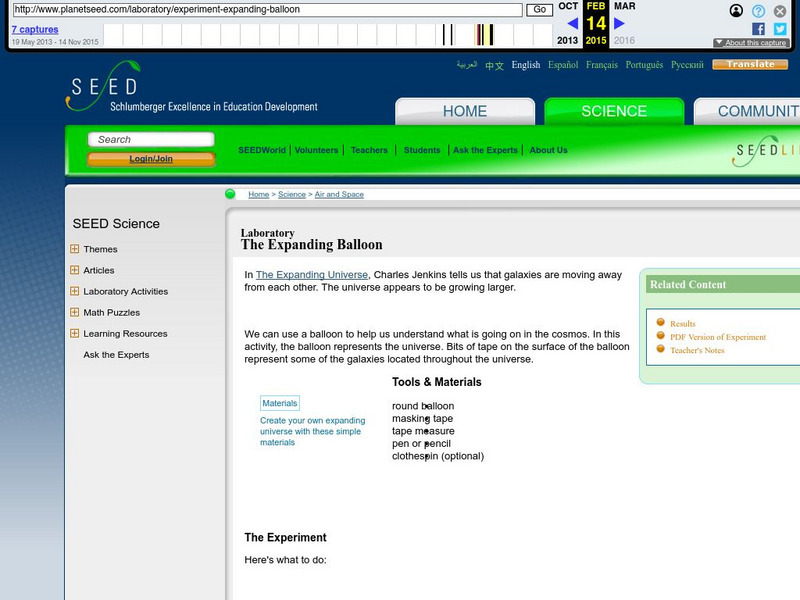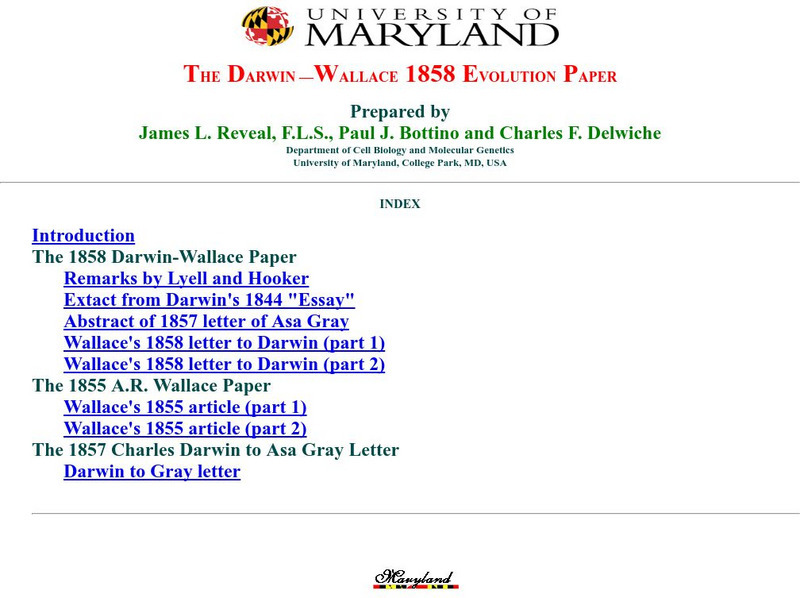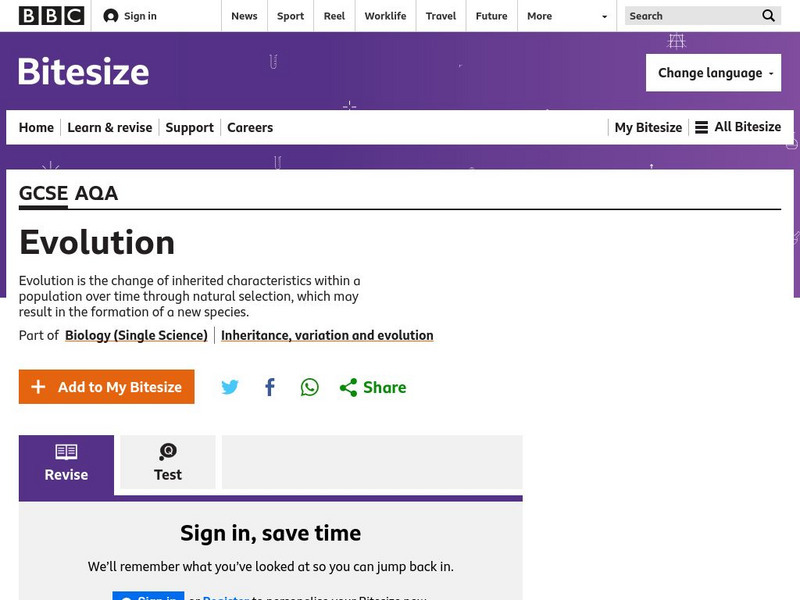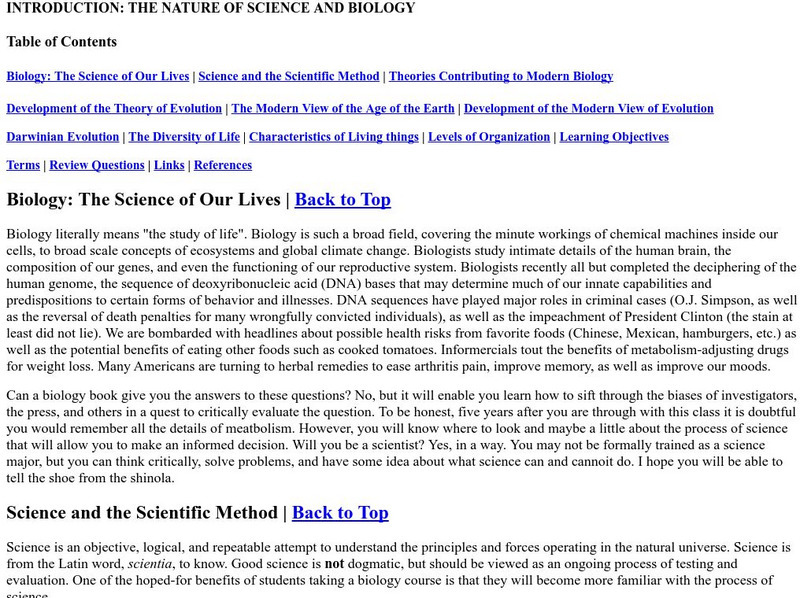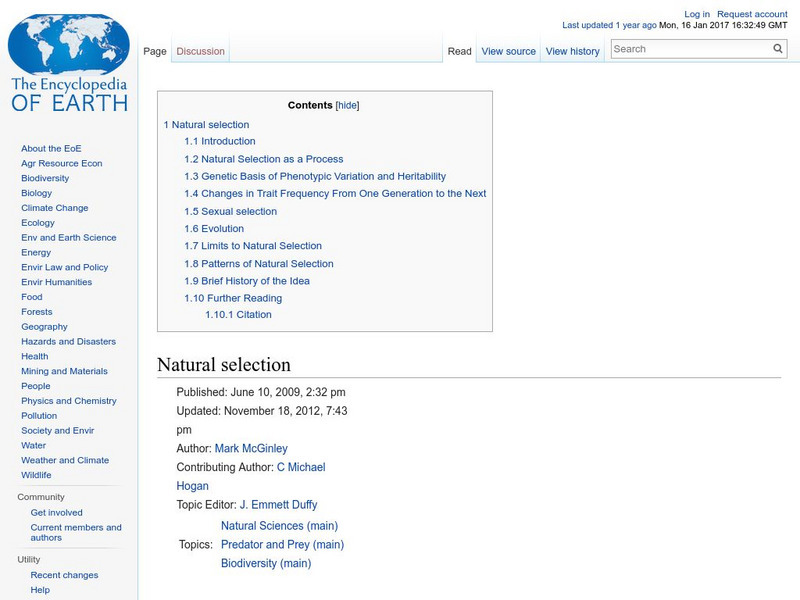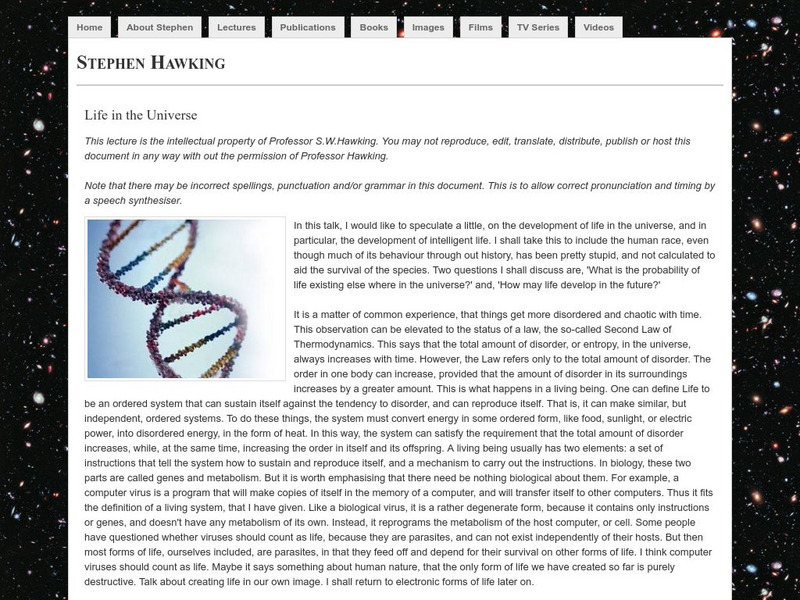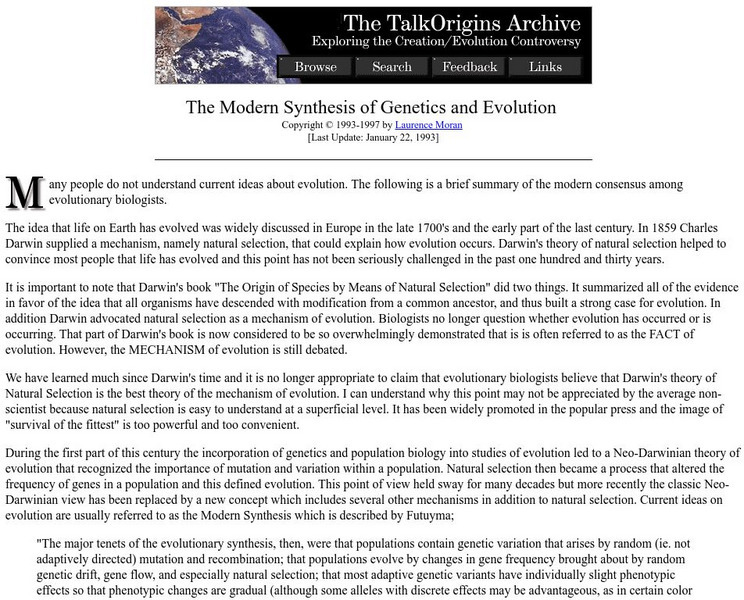History Tools
History Tools: Charles Darwin on the Origin of Species 1859 [Pdf]
Features excerpts from the introduction and conclusion of Charles Darwin's famous book, On the Origin of Species by Means of Natural Selection.
CK-12 Foundation
Ck 12: Earth Science: Evolution, Plate Tectonics, and Climate Change Study Guide
[Free Registration/Login may be required to access all resource tools.] Summarizes the key points about three theories in Earth Science: the theory of evolution, the theory of plate tectonics, and the theory of climate change due to...
CK-12 Foundation
Ck 12: Biology: Evolution of Life
[Free Registration/Login may be required to access all resource tools.] Overview of the evolution of life and Darwin's theory of evolution.
NPR: National Public Radio
Npr: Taking Issue: Evolution and Religious Faith
Learn what five different religions have to say about the shaping of life and evolution. [August 8, 2005]
Cornell University
Cornell University: Library: Charles Darwin After the Origin
In honor of Darwin's 200th birthday and the 150th anniversary of the publication of "The Origin of the Species," Cornell has put together an extensive collection of Darwin's work during the last two decades of his life.
Other
The Expanding Balloon Experiment
Great science experiment to help aide in the understanding of the Big Bang Theory. Students are able to complete this experiment with little materials and individually.
Other
University of Maryland: Darwin Wallace Evolution Paper
A comprehensive description of the papers on Natural Selection published by both Darwin and Wallace in 1858. Includes full copy of Wallace's paper, 'On the Law which has regulated the Introduction of New Species.' Also includes...
CPALMS
Florida State University Cpalms: Florida Students: Evolution: Examining the Evidence
Strengthen understanding of how different types of scientific evidence support the theory of evolution, including direct observation, fossils, DNA, biogeography, and comparative anatomy and embryology.
George Mason University
Chnm: Between the Wars: The Scopes Trial
Read the fascinating transcript of the proceedings in court when Clarence Darrow called William Jennings Bryan to the stand to expose the weakness in his argument against evolution in the famous Scopes trial.
Other
Evolution: The Theory of Natural Selection (Part 1)
These pages are part of a site called Evolution that accompany a textbook by the same name. Mark Ridley is the author. This section has an advanced discussion of determining allele and genotype frequencies using the Hardy-Weinberg ratio.
BBC
Bbc: Gcse Bitesize: Evolution
Evolution is the change of inherited characteristics within a population over time through natural selection, which may result in the formation of a new species.
Open Curriculum
Open Curriculum: Evidence for Evolution
With this article, students will be able to clarify the significance of a scientific theory and recognize that Darwin supported his theory with a great deal of evidence, and that many kinds of evidence since his time have further...
CK-12 Foundation
Ck 12: Life Science: 4.3 Natural Selection
Explore the theory of evolution by means of natural selection.
Other
The Rise of Evolutionary Biology: Biology Before Darwin
These pages are part of a site called "Evolution," that accompanies a textbook by the same name. Mark Ridley is the author. Here he discusses theories for species change that were before Darwin published "On the Origin of Species."
PBS
Pbs Learning Media: Darwin's Letters: Collecting Evidence
This group of letters is a sample of the extensive correspondence Darwin carried on with a wide group of friends and colleagues as he collected evidence to support his theory of evolution by natural selection. From Charles Darwin's...
National Science Foundation
National Science Foundation: Evolution of Evolution: 150 Years of "On the Origin of Species"
When the "Origin of Species" was published in 1859, the ambitions and scopes of science were dramatically expanding. "Origin of Species" marked the transition of biology from a prescience to a science. [4:04]
Estrella Mountain Community College
Online Biology Book: The Nature of Science and Biology
Use the scientific reasoning and critical thinking to take an in-depth look at the basics of biology.
Encyclopedia of Earth
Encyclopedia of Earth: Natural Selection
Scientific article explaining what natural selection is, and how it manifests itself through genetics and from generation to generation. Natural selection is compared to genetic drift, both of which cause evolution to occur. The limits...
Biology Corner
Biology Corner: Peppered Moths Simulation
This simulation allows students to take on the role of a bird and eat different types of peppered moths. Students analyze which types of peppered moths do better in various environments.
Other
Stephen W. Hawking: Lectures: Life in the Universe
This lecture covers the topic of life now and into the future, including the role genetic engineering will play.
National Humanities Center
National Humanities Center: America in Class: America in the 1920s: Felix the Cat
The National Humanities Center presents collections of primary resources compatible with the Common Core State Standards - historical documents, literary texts, and works of art - thematically organized with notes and discussion...
Talk Origins Archive
The Talk Origins Archive: Modern Synthesis of Evolution
This site from The Talk Origins Archive provides an article entitled, "The Modern Synthesis of Genetics and Evolution". The article is medium size in length and describes the most current ideas about evolution.
Indiana University
Indiana University: Evolution of Continents and Oceans
A course lecture on how the Earth's geological features have evolved through the movements of tectonic plates. Explains the different types of plate boundaries and how they manifest in geological formations. Also describes the structure...
Story Behind the Science
Story Behind the Science: Ice Ages, an Alien Idea [Pdf]
Article describing the scientific evolution of theories about the ice ages and glaciation. The international efforts of scientists are noted, as well as the influence of societal mores on how long it would generally take for new ideas to...
![History Tools: Charles Darwin on the Origin of Species 1859 [Pdf] Primary History Tools: Charles Darwin on the Origin of Species 1859 [Pdf] Primary](https://static.lp.lexp.cloud/images/attachment_defaults/resource/large/FPO-knovation.png)



